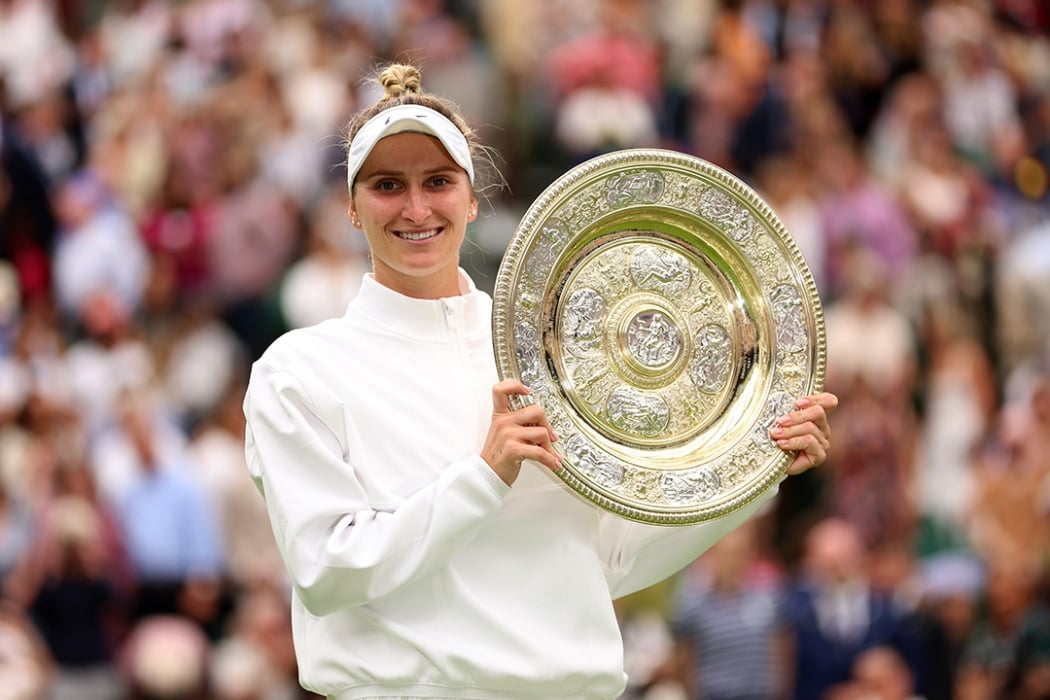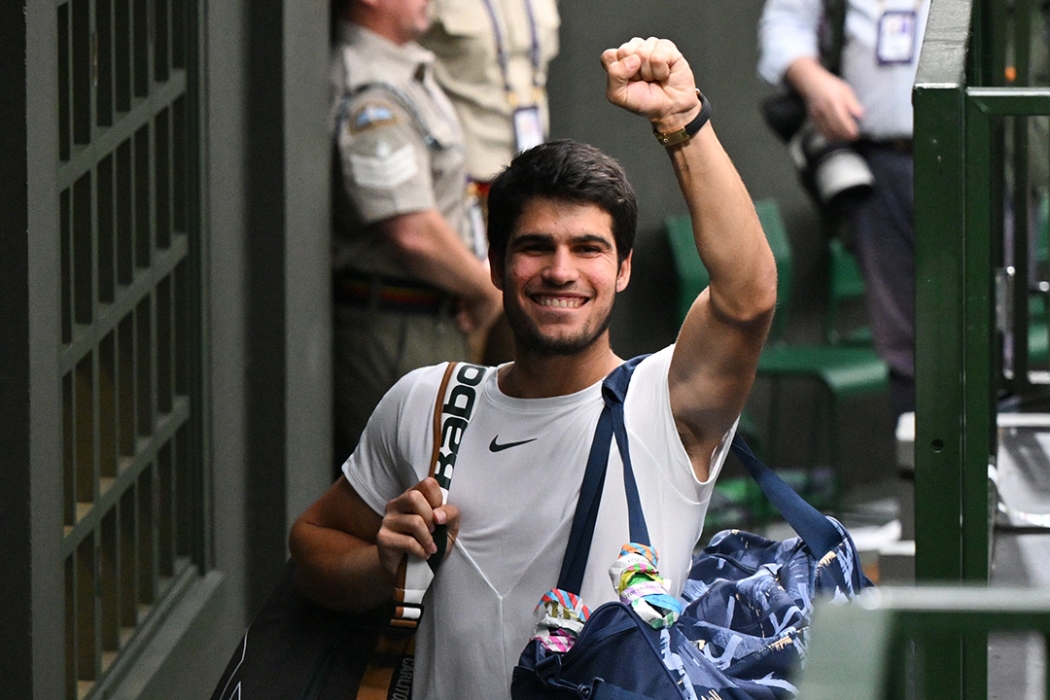You could be forgiven for not believing what you were seeing, as Carlos Alcaraz approached the line to serve for a five-set victory over Novak Djokovic in the 2023 Wimbledon final.
This was a player who, just five weeks ago, was so overwhelmed in their Roland Garros semifinal he could barely compete beyond the second set, his body seized by cramps.
On Sunday, Alcaraz was blitzed 6-1 in the opening set by Djokovic, who had never lost a match at Wimbledon after winning the first set.
And yet here Alcaraz was, on his least-known surface, in a match approaching the five-hour mark, on the brink of beating a player who had, literally, become unbeatable on this court.
This final game did not begin well.
Alcaraz quickly bailed out of the first point with an ill-advised drop shot, and landed it in the net. Yet another drop-shot came, followed by a winning lob, for 15-15. Then a lunging volley winner for 30-15. You need belief, and relaxed hands, to play points like that, extraordinary given this juncture of the match.
Two points later, a powerful first serve extracted a return error, and the 20-year-old arrived at championship point.
This was perhaps not the advantageous position it would seem. Djokovic stared down match points in the 2019 Wimbledon final against Roger Federer, rebounding to win the title. Both he, and Alcaraz, remembered this. Djokovic even mentioned it in the trophy presentation.
Alcaraz somehow won anyway, 1-6 7-6(6) 6-1 3-6 6-4.

“Before this match, I thought I can't beat Novak,” admitted Alcaraz, who retains the world No.1 ranking after winning his second major title in the past year.
“But after this epic match, let's say, I think different about Novak in the way that probably in other tournaments, in other Grand Slams, I will remember this moment. I will think that I'm ready to play five sets against him, good rallies, good sets, really long match, and stay there physically, mentally, in tennis, in general.
“Beating Novak, winning Wimbledon championship is something that I dream about since I start to playing tennis.
“That's why is the biggest moment of my life.”
Quick learner
Not only was this an incredible turnaround from what happened in Paris, but it was especially so, considering the surface.
Alcaraz has in his short career already flourished at the highest level on clay, and his Grand Slam breakthrough came on US Open hard courts.
Meanwhile, he had only played two tournaments – ever – on grass when he arrived at Queen’s Club. He won that tournament, and kept on winning.
Alcaraz has now won 12 consecutive matches on grass, one of just three players in the Open Era – along with Lleyton Hewitt and Boris Becker – to win this many in a row before turning 21. He is also the youngest player to win Wimbledon since Becker in 1986.
Hewitt, Pete Sampras, Rafael Nadal and Andy Murray are the only others to win the Queen’s/Wimbledon double since the formation of the ATP Tour in 1990.
“I thought that I’ll have trouble with you only on clay, and maybe hard court, but not on grass,” a gracious Djokovic laughed during the trophy ceremony. “But now it’s a different story. Congrats. Amazing way to adapt to the surface.”

This was the latest proof of Alcaraz’s instincts to learn, grow, adapt and recover, and what is becoming a quite uncanny ability to bounce back from recent disappointments.
“I am totally different player than French Open. I grew up a lot since that moment,” the Spaniard said.
“I learned a lot from that moment… I could deal with the pressure, the nerves, better than I did in French Open.
“Obviously on grass is different than on clay. But I'm really happy to be able to stay there. Didn't get down, didn't give up. I fought until the last ball.
“I think was the mental part that allow me to stay there during the five sets.”
A dominant reign ends
These mental strides were especially impressive, given Alcaraz knew precisely what he was confronting when he walked onto Centre Court behind the four-time defending champion, who had recently won a record 23rd major title in Paris.
After winning Queen’s, Alcaraz mentioned how “crazy” it was Djokovic had not lost on Centre Court since the 2013 final against Andy Murray.
How poetic is was that Murray watched from the stands as Alcaraz matched his feat.
At the same time, Alcaraz snapped myriad other streaks.
He settled after that disastrous first set, and arrived in a second-set tiebreak against Djokovic, who had won his past 15 tiebreaks at majors – a run dating back to AO 2023.
Here, Djokovic led 3-0, and later held a set point for a two-sets-to-love lead. Yet Alcaraz wrested it from him, and it changed the course of the match.
“It was really good for me 'cause if I would have lost that set, probably I couldn't lift the trophy. I probably could have lost in straight sets,” said Alcaraz, who became the first player since Mario Ancic in 2006 to beat Djokovic in a fifth set at Wimbledon.
“I would say that gave me a lot of confidence, a lot of motivation to still (keep) going and to think that I'm able to win.”
Alcaraz is a freak
— Nicholas Kyrgios (@NickKyrgios) July 16, 2023
Haven’t watched a whole tennis match in a long time haha THANKYOU @DjokerNole & @carlosalcaraz for putting on that incredible performance. Congratulations to you both 👑🙏🏽
— Nicholas Kyrgios (@NickKyrgios) July 16, 2023
Win he did, handing Djokovic his first loss in a completed match at Wimbledon since 2016, and first of any kind since 2017. The Serb had won his past 34 matches at Wimbledon, and 45 in a row on Centre Court.
He had been 78-0 in matches at Wimbledon if he won the first set.
The reigning Australian Open and Roland Garros champion, Djokovic was 20-0 at the majors in 2023, and undefeated in his last 27 Slam matches. His previous loss was 14 months ago, to Nadal, in Paris in 2022.
Ending along with those undefeated runs was his quest for the calendar Grand Slam.
Changing of the guard?
Until this point, Djokovic seemed unbeatable on the game’s grandest stages.
This was especially so on Wimbledon’s lawns, where his superiority was even more pronounced over the rest of a comparatively inexperienced field.
Previewing the tournament, doubles great Todd Woodbridge said: "Djokovic is probably the heaviest favourite coming into Wimbledon that I've seen for a very long time.”
After the first week, former world No.8 Alicia Molik wondered: “Does anyone actually walk out there and believe they can beat him?”
And as we reached the business end, sportswriter Charlie Eccleshare was asked on The Tennis Podcast if he had spoken to anyone during the tournament fortnight who didn’t think Djokovic would triumph.
"No,” he answered. "It's so hard to bet against him. I don't know a single person.”
It helps explain why Alcaraz’ victory is so seismic, and why it made global headlines on Sunday evening, or Monday morning, depending on your location in the world.
Boosting its significance further was the fact it seemed a true “passing of the torch” moment. This narrative has persisted in men’s tennis for almost a decade, but had never truly materialised.
In fact, Alcaraz became the first player not named Djokovic, Federer, Nadal or Murray – the sport’s celebrated “Big Four” – to win Wimbledon in 21 years.
It’s unclear whether Alcaraz’ triumph boosts the belief of his contemporaries, or diminishes Djokovic’s incredible aura.
Yet given this result is so unlike what the tennis world has become accustomed to, it sets the stage brilliantly for the rest of the season – and beyond.
“Beating Novak at his best, in this stage, making history, being the guy to beat him after 10 years unbeaten on that court… It's something that I will never forget,” said Alcaraz, who finished the fifth set with 18 winners to just five unforced errors.
“It's great for the new generation, as well, I think to see me beating him and making them think that they are capable to do it, as well.
“It's great for me and I think for the young players.”

